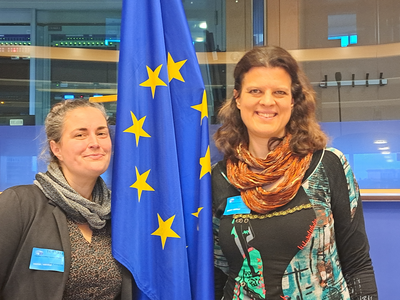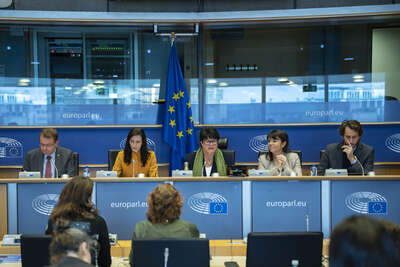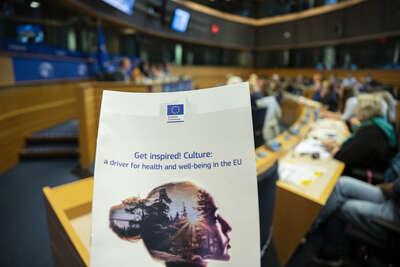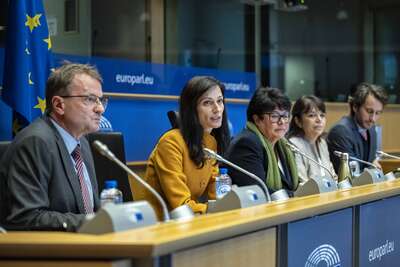Culture as a driver for wellbeing: Our intervention at the European Parliament
On 16 November, Mariya Gabriel, Commissioner for Innovation, Research, Culture, Education and Youth, and Sabine Verheyen, Chair of the European Parliament’s Committee on Culture and Education, jointly organized the seminar “Culture as a driver for health and well-being in the EU.” Natalie Porias was invited to share the mission and vision of RED NOSES.
Participants from all over Europe and from various backgrounds, discussed the role that culture plays for health and well-being. Specifically, together with Nils Fietje from World Health Organization, Kornelia Kiss from Culture Action Europe and other experts, we had the opportunity to talk about the importance of breaking the silos between health and culture and to offer solutions to today’s complex challenges regarding mental health and well-being.
Natalie Porias shared part of her vision as Managing Director of RED NOSES International: "Art can and should also exist in the most unexpected areas of our life, where suffering, fear and even displacement are overshadowing the realities, may it be a hospital environment or a refugee centre. We believe that people who know how to play and laugh are more resilient and that by bringing the power of art and humour to places of crisis and hardship, we can contribute to this. That’s why we are convinced that artistic and humorous approaches should be systematically integrated into #healthcare systems and #humanitarian response mechanisms. The European Mental Health Strategy 2023 is an excellent opportunity to do so."
We would like to inform you that after activation of the video data is transmitted to the provider. More information can be found in our Data protection
ACTIVATE VIDEOAt this point we would like once again to say thank you to both Mariya Gabriel, and Sabine Verheyen for inviting us to speak at their event and be part of the contructive exhange of ideas.
Furthermore, during the seminar, representatives from Culture For Health unveiled the CultureForHealth Report, “Scoping review of culture, well-being, and health interventions and their evidence, impacts, challenges and policy recommendations for Europe”, showcasing the findings of over 300 scientific studies that show art and culture’s contribution to health and wellbeing.
The aim of this scoping review is to synthesise existing evidence on the positive effect of arts and cultural activities on health and well-being. It seeks to provide a clear indication of the volume of existing literature, the key concepts, focus points and the types of studies that exist. It also identifies knowledge gaps in the existing literature and it gathers policy recommendations and identifies challenges, further expanding the scope of the report beyond the proposed policy directions and specific policy measures.
The report contains findings and studies regarding the art of clowning and its critical role in improving health and well-being. For example: "Systematic reviews indicated that hospital clown interventions were significantly effective in the reduction of stress and anxiety levels in hospitalised paediatric patients and their parents". Besides that, it is also mentioned that “the provision of hospital clown interventions for procedural support and as part of routine medical care in chronic conditions can lead to beneficial health effects in hospitalised young patients, including reduction of pain, anxiety and cancer-related fatigue, as well as improved psychological and emotional reactions, and in patients’ overall sense of well-being".
The Report is available here
*This seminar on “Culture as a driver for health and well-being in the EU” was one of the actions undertaken by the European Commission and the European Parliament to inspire a true policy change in the wake of the COVID-19 pandemic and its impact on everyday life, as it became necessary to address the topics of culture, health and well-being at a larger scale. The seminar was part of the Commission’s work on mental health, whose importance has been underlined by President von der Leyen in her latest Sate of the Union address.
Source: European Commission, European Parliament and Culture For Health
© Photos




